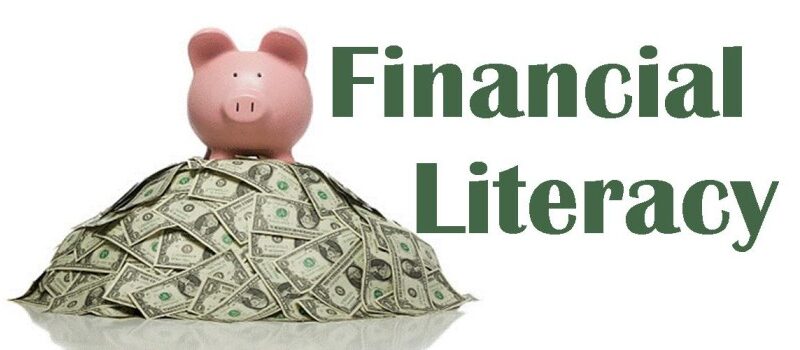5 Financial Literacy Books That Will Change Your Life
1. “Rich Dad Poor Dad” by Robert Kiyosaki:
“Rich Dad Poor Dad” by Robert Kiyosaki is a groundbreaking personal finance classic that goes beyond traditional money management advice. The book revolves around Kiyosaki’s life experiences with two father figures – his biological father (referred to as “Poor Dad”) and his childhood best friend’s father (referred to as “Rich Dad”).
The core of the Financial Literacy books lies in the differing financial philosophies of these two influential figures. Kiyosaki contrasts the traditional mindset of working for a paycheck, saving money, and avoiding risks (Poor Dad’s perspective) with an unconventional approach of investing, building wealth, and taking advantage of opportunities (Rich Dad’s perspective).

Key Themes and Insights:
Assets vs Liabilities:
Kiyosaki introduces the concept of assets and liabilities as important elements in achieving financial success. Emphasis is placed on acquiring income-generating assets as a key strategy for wealth building.
Importance of Financial Education:
The book outlines the importance of financial education, arguing that schools often neglect practical money management skills. Kiyosaki advocates self-education and continuous learning in the field of personal finance.
Entrepreneurial mindset:
Rich Dad encourages an entrepreneurial mindset, urging readers to explore opportunities, take calculated risks, and learn from failures. The book challenges the idea of job security and highlights the potential for financial growth through entrepreneurship.
Making money for you:
Kiyosaki emphasizes the power of making money for yourself through investing, rather than relying solely on earned income. This involves understanding and taking advantage of the principles of passive income.
Change in mindset:
“Rich Dad Poor Dad” encourages a fundamental mindset shift from being an employee to being an investor and entrepreneur. The book aims to inspire readers to break free from traditional financial example and achieve financial freedom.
Overall, “Rich Dad Poor Dad” has had a profound impact on the way people think about money and wealth-building. Its accessible language, relatable story, and actionable advice make it a valuable resource for those who want to take control of their financial destiny. Whether you are a beginner or experienced investor, the principles shared in this book can provide valuable insight and inspiration for your financial journey.
2. “The Millionaire Next Door” by Thomas J. Stanley and William D. Danko:
Thomas J. The Millionaire Next Door, written by Stanley and William D. Danko, is a seminal work that challenges common belief of wealth and provides a revealing look at the habits and characteristics of everyday millionaires. Published in 1996, the book is based on an extensive survey of millionaires in the United States and provides information about their lifestyle, spending patterns, and financial practices.

Key Themes and Insights:
Frugality and Discipline:
One of the central themes of the book is the idea that many millionaires accumulate wealth not through massive spending but through disciplined savings and frugal living. The “neighbor millionaire” is often a person who lives modestly and avoids unnecessary luxury.
Entrepreneurial spirit:
The book highlights the commonness of entrepreneurial spirit among millionaires. Many of them have built their wealth through small businesses and self-employment rather than high-paying corporate jobs.
Education and Planning:
The author emphasizes the importance of education and careful financial planning to achieve millionaire status. They emphasize that high income alone does not guarantee wealth; It is the combination of sensible financial habits and a strategic approach towards money that leads to lasting prosperity.
Avoiding Debt:
The book highlights the hated to debt among millionaires. Rather than relying on credit, these individuals prefer savings and investments, giving them the opportunity to accumulate wealth over time.
Investment Strategies:
“The Millionaire Next Door” highlights the investment strategies of millionaires, showing their preference for long-term, conservative investments. It emphasizes the importance of consistent, informed investing as a key component of financial success.
Community Impact:
The book explores the impact of community and social factors on wealth accumulation. It challenges the perception that millionaires always demonstrate elite wealth and highlights the undervalued nature of many wealthy individuals.
Ultimately, “The Millionaire Next Door” challenges stereotypes about money and offers a blueprint for achieving financial success by focusing on disciplined habits, strategic planning and long-term wealth accumulation. It encourages readers to reconsider their views on money and adopt prudent financial practices that can lead to financial freedom and security.




